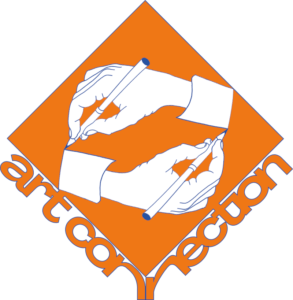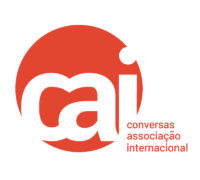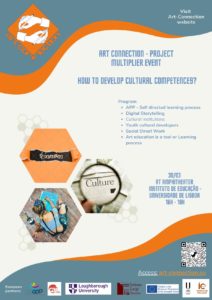
Dance, Maria Helena Vieira da Silva, 1938

Conversas Associação Internacional works with and for vulnerable audiences, some in street situations
Conversas Associação Internacional (CAI)
A young Portuguese association, CAI is an association specialized in the implementation of practices and methodologies to support “street social work”. These practices focus on connecting vulnerable audiences, some of whom are in street situations, through active and participatory pedagogical practices, including through art education. With the support of SwTI (Street Work Training Institute) which is part of the international dynamic of the network of street workers, present in 51 countries, CAI offers a strong potential for observation, with an international dimension, of innovative pedagogical practices.
Role in the Art-Connection project
CAI contributed to all intellectual productions and was responsible for the 3rd and 4th deliverables (Guidelines and pedagogical tools). CAI has been responsible for the organization of the 2nd dissemination event which took place in Lisbon on March 30, 2022.
Referent of the Art-Connection project in Portugal:
Helder Luiz Santos – Project Manager
CAI Action Research
See the Art-Connection case studies from participatory action research in the territorial contexts of partners in the Toolkit for Cultural Connectors, chapter 2.3 and the UNhandbooks from – The street as a place of non-formal education.
The main objective of the participatory research, conducted by CAI and SwTI – Street work Training Institute, was to implement and evaluate with adult learners targeted by them (micro level), street social workers (meso level), and trainers of these educators (macro level), with the aim of identifying the skills needed to become a promoter of cultural competences among their target populations – the skills required of the Cultural Connectors.
Working with these three groups, despite their different backgrounds and roles, the study showed that they had a shared understanding of what the soft skills needed for Cultural Connectors are.
The literature is prolific in demonstrating that increasing the use of learning methodologies using cultural competences has a direct impact on vulnerable groups, stimulates self-directed-learning and social inclusion, and develops the necessary skills that enable them to better access the labour market and be active citizens in their communities.
The methodology of street social work has long been used by the education, culture and social affairs sectors for social inclusion purposes. It has developed in particular on educational strategies based on cultural, intercultural and non-formal activities. This methodology has developed in particular on the basis of educational strategies based on cultural, intercultural and non-formal activities. Street educators use a pedagogical approach based on the global approach to the life course, to develop an educational relationship with the target populations (vulnerable groups or in vulnerable conditions). The aim is to develop technical and social skills that enable them to deal with important problems. For example, to address issues related to NEET youth, such as early school leaving, anti-social behaviour, illiteracy or the lack of learning path required to enter the labour market.
Skills training plays a central role not only in economic development, but also in the sustainability and resilience of contemporary societies.
The development of specific social and personal skills aims to create the next generation of responsible and active citizens, “capable” and “trained” adults, who will have the flexibility to adapt to the demands of the labour market and society in general, but also to solve the complex difficulties assigned to them as active citizens.
In this way, social diversity is recognized, as well as the need for continuous adaptation of people to new developments.
Art-Connection in Lisbon
30 March 2022 – Lisbon
What pedagogical tools to support actors in the field of adult education and training in the paradigm shift in orientation, evaluation and recognition/validation/certification of prior experience?






